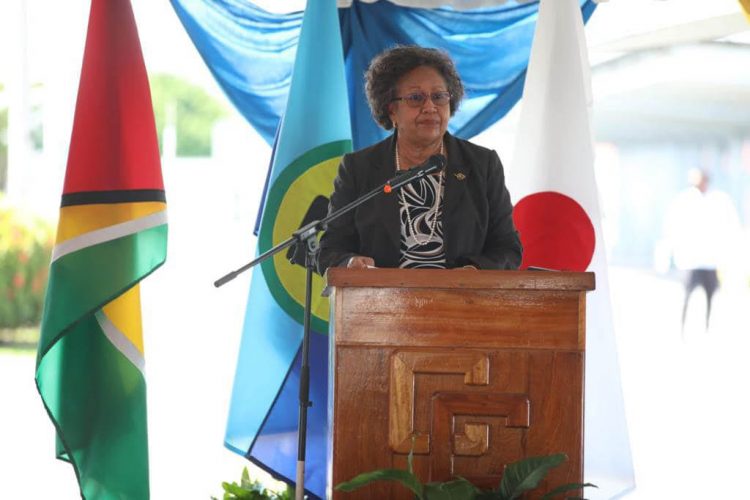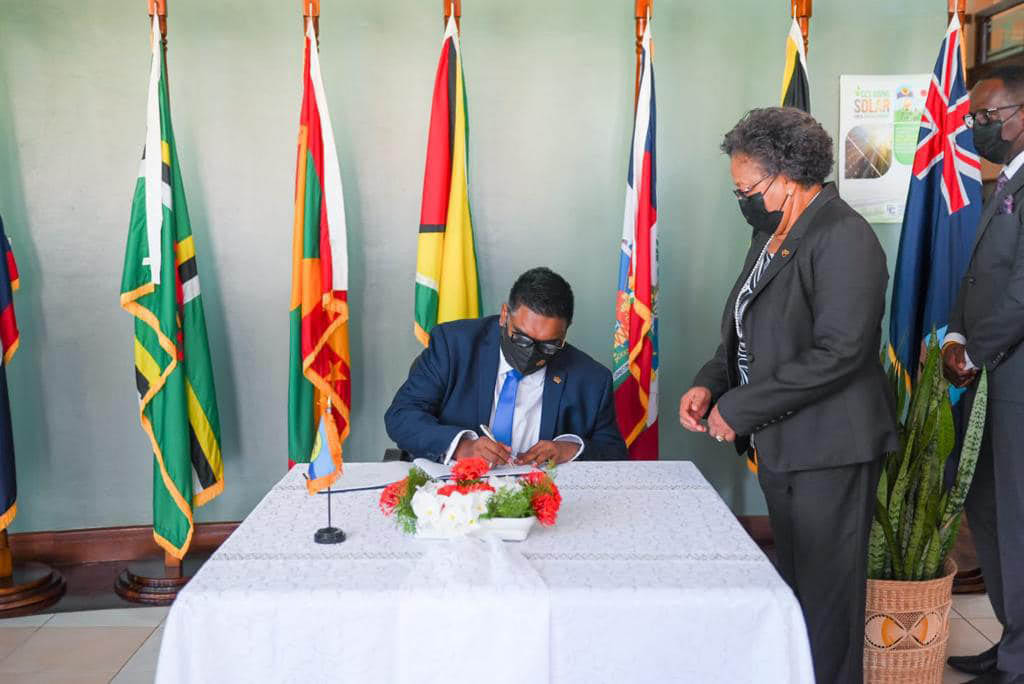With over 1,500 solar panels lining its front lawn at Liliendaal, Greater Georgetown, the Caribbean Community (CARICOM) Secretariat is expected to channel excess energy to the national grid during the off-peak season according to Secretary-General Dr Carla Barnett.
The disclosure was made yesterday at the commissioning of the US$7 million collaborative project between the Governments of Guyana and Japan. As part of the 2018 US$17.8 million agreement, the 400-kilowatt solar photovoltaic power generation plant with battery and Building Energy Management Systems project was executed.


(Office of the President photo)
“This PV power generation system is expected to generate more electricity than is required by the Secretariat for its operation on an annual basis and the expectation is that the available excess energy would feed into the utility grid during its off-peak operation periods. The Secretariat is seeking to conclude the arrangements which will obtain the bi-directional flow of electricity with GPL in this quarter,” Dr Barnett told the gathering.
She added that the investment is already transforming the way the Secretariat is sourcing and using energy.
The agreement was signed on June 27, 2018, by the two governments and the project was expected to be completed earlier. However, with the advent of the coronavirus pandemic and subsequent lockdown measures, work on the project was delayed for over one year. Work resumed in May of last year and it was completed in December.
SG Barnett, who is from Belize, explained that as CARICOM member states are moving away from fossil fuel-powered energy to cleaner and renewable sources, the project represents the community’s seriousness towards tackling climate change. She lauded the partnership with Japan.
“The ambition which this project represents is anchored within our regional strategy, which permits all member states to pursue opportunities for integrating renewable energy resources with energy efficiency measures to meet energy needs in support of economic, social and environmental sustainability.
“Growth is fragile and vulnerable for CARICOM countries. We are exposed to hazardous features over which we have little control or influence. The current pandemic serves as a manifestation of this the exposure of our countries to a variety of global shocks is greatly heightened by the challenge of adapting to extreme weather events which interrupt economic development and force us to adjust public and private sector investment to the severe losses and damage caused by these events,” she said.
The design of the project takes into consideration the natural hazards like flooding and incorporates mitigating measures in an effort to preserve the integrity of the panels and accompanying infrastructure.
Unconditional assistance
While celebrating the commissioning and handover of the project, Guyana’s President Irfaan Ali made a clarion call for greater assistance in mitigating climate change effects and adapting to those changes. He noted that CARICOM stands to be the most affected and as such there should be unconditional assistance.
“We need support. It is unfortunate that we’re hearing about a lot of commitments and a lot of figures but we’re seeing no real attempt in translating those commitments to projects on the ground… We don’t want to believe that it is not credible. We believe that the commitment is credible but there needs to be urgent action in demonstrating that commitment by not adding conditions to the countries, but by supporting the existing pipeline of projects to meet the targets that we have outlined individually and collectively as a region,” he stated.
He added that by going solar, the CARICOM Secretariat shows member states and the wider world that it takes its commitment of addressing climate change and transitioning to cleaner and renewable energy and power seriously. He said that the headquarters is leading by example while urging innovative thinking in achieving the renewable energy mandate.
“We know that this is where the world is going and we know also that we have to transition. So this is another example of the region’s leadership and the region itself being a futuristic and proactive approach.
“It is also about leadership. We can’t be talking about renewable energy and making no attempt to transition at the home of the region and the same could be said about countries we can’t be talking about reducing the cost of energy transitioning to cleaner energy, and we’re not doing anything to transition to that,” Ali lamented.
Pointing to investments in hydro and solar along with proposed natural gas projects, Ali said that his government is doing more than just talking when it comes to the clean energy commitment. He also urged the outgoing Japanese Ambassador Tatsuo Hirayama to advocate for even greater sharing of expertise in the realm of clean energy.
The Ambassador expressed his government’s commitment towards improving cooperation with Guyana and the wider CARICOM. He pointed to the already strong relationship between the community and Tokyo by talking up his government’s assistance over the years and in particular help in fighting COVID-19.
Prime Minister Mark Phillips, who holds the energy portfolio, also expressed his gratitude to the Japanese government.









